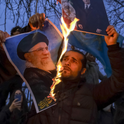"I will take the cup to Thawra City—I mean Sadr City; I will take it to Kadhimiya, to Adhamiya, to Dora; I will take it to Basra, to the north, to Mosul. Even if they kill me, I am a willing sacrifice for my people." So said 24-year-old Younis Mahmoud, captain of Iraq's national football team, to Iraq's official television station Al-Iraqiya during a snap interview in Dubai, following Iraq's victory in the Asian Cup in late July. Mahmoud is a Sunni Arab who was born in the oil-rich town of Dibis, northeast of Kirkuk. He grew up among other Sunni Arabs, Shia and Sunni Turkmen, Kurds and Christian Assyrians—a diversity reflected in the team he led to Iraq's first major football victory.
After Iraq defeated South Korea in a semi-final penalty shoot-out—unleashing jubilation among Iraqis inside and outside the country and raising cautious hopes of bringing the cup to Baghdad—Iraqi singers began to record songs for the final, and the ditty that became the team's anthem began with the words, "Have you ever seen a player on the fields play while pressing his hand to his wound?"
Al-Iraqiya's coverage was saturated with national unity, backed up with phone-in shows and constant spot interviews on the ground. For a week after the victory, there were street parties throughout the country, even in the restive Sunni provinces and the ostensibly separatist Kurdish cities. One popular slogan was, "Islam is Sunnis and Shias. We will not sell out this country." On their way back to Iraq, the team made stops in Dubai and Amman, firing up celebrations among Iraqi expats. On returning, the team awarded the cup to a mother who had lost her 12-year-old son when a suicide bomber—in all likelihood a Saudi—targeted a group of Baghdad revellers celebrating the semi-final victory.
The foreign media treated this story as a flash in the pan, but it involved much more. These Iraqi men and women of all ages were sending a clear message from the streets. "We reject civil war, we reject violence, we want to live," said a middle-aged man interviewed in Basra. The images of Kurds waving the Iraqi national flag and Sunnis in Anbar province dancing to blaring music in a former al Qaeda bastion did not fit the editorial lines in the western media—that Iraq is a hopeless sectarian ruin, enjoying a superficial moment of euphoria on its way to break-up.
Younis Mahmoud was delayed returning to Baghdad while negotiating with Arab and French clubs. Predictably, this was interpreted by foreign reporters as a sign he was afraid of returning home. Mahmoud currently plays his football in Qatar, but a lucrative international career awaits.
Celebrating the victory in Istanbul
On the night of the final, which took place in Jakarta, I headed out to Istanbul's busy Taksim Square right after the final whistle had blown, looking for a party. Disappointed not to find fellow celebrants, I turned back to watch the party on television—only to find a group of 50 young men in sports clothes streaming on foot to the square, some with the maps of Iraq on their necklaces. A couple of cars flying the Iraqi flag honked past us. I had found my crowd.
When the Iraqis had reached the square, plain-clothed Turkish security men with walkie-talkies became aggressive and demanded that the Iraqi flag be put away, but a quick-witted Turkmen climbed up on the shoulders of his friend and began waving the Turkish and Turkmen flags alongside the Iraqi, while shouting pro-Atatürk slogans. The officers slinked away and allowed the group to party for about an hour. Drawing in crowds of other Iraqis holidaying in Istanbul, as well as bands of Japanese tourists, the youngsters began to chant and sing to the beat of a drum. One Iraqi lady arrived with a big bag of sweets and began tossing them in the air, sending Istanbul's street urchins scampering after the booty on the ground.
At one point a man called Leith, a Christian, turned to the flag-waver who was the focus of the hullabaloo and whispered something in his ear. The fellow turned around and yelled out thanks to "Uncle Jamil" for bringing them together. Jamil, a Kurd from Mosul, was asked about his motivation. "We're just normal people who love our country. I hope the politicians in Baghdad will follow our example," he said. "You can see that all these guys, who come from all sorts of sects and ethnicities, can be friends. That's the Iraq we want."
The jihadi response
Almost all of Iraq's political actors tried to seize upon Iraq's victory to earn popular points, but not the Sunni jihadists, or at least not all of them. A statement released on the internet by Hamas-Iraq—no relation to the Palestinian group—congratulated the Iraqi team and expressed the wish that the victory would be a forerunner to the joy of expelling the "occupiers." But others on the jihadist discussion forum al-Hesbah denounced Hamas-Iraq for championing the "Shia" team. Most of the participants on such forums are believed to be Saudis, who may be miffed that it was their team that lost 1-0 to Iraq in the final.











